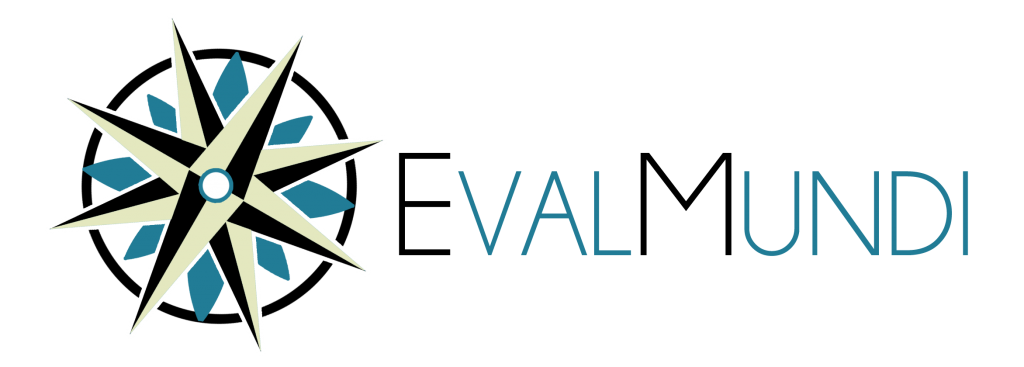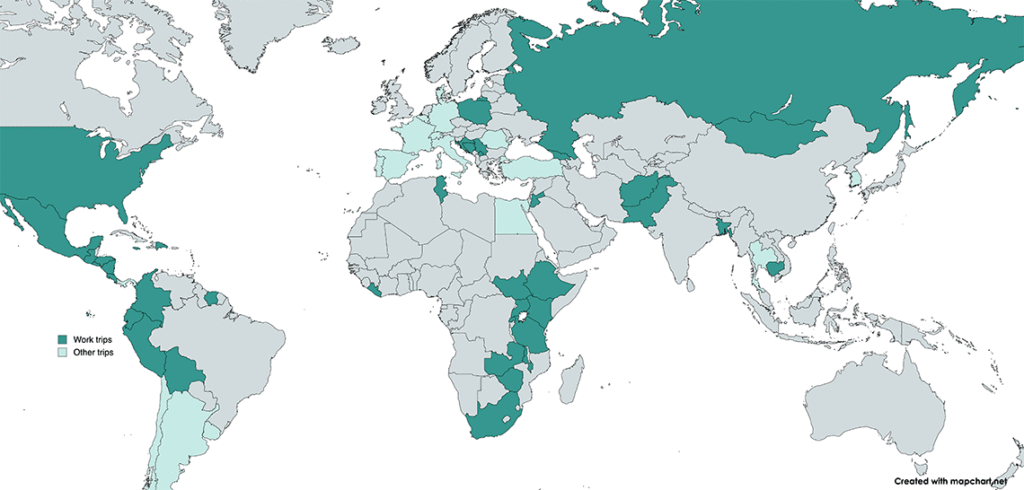
EvalMundi, LLC is a one-woman firm specializing in evaluation of international cooperation programming worldwide. Since 2017, EvalMundi has worked with the U.S. Agency for International Development, World Food Programme, the Development Finance Corporation, the Millennium Challenge Corporation, and the U.K.’s renamed Foreign, Commonwealth and Development Office, and NGOs, among others. With EvalMundi, I have evaluated projects in forty countries, including data collection site visits in Colombia, El Salvador, Kosovo, Jordan, Malawi, Mongolia, Kenya, Uganda, Rwanda and Tanzania and remote work in Indonesia, the Philippines, Vietnam, Cambodia, Senegal, among others.
With EvalMundi, I work to meet client needs while ensuring evaluation independence across sectors, funders, and regions. My key goals are to make evaluations genuinely more participatory, to empower women and vulnerable groups, and to learn from and develop local evaluation expertise.
Send Keri a message if you’re interested in working with EvalMundi
A personal message about my professional life
Ever since I found evaluation, I’ve loved my job. With all the travel it has entailed, this career has been as much a lifestyle choice as a way to make a living and try to contribute. I remember celebrating birthdays in Ecuador and Zimbabwe, finagling family Skype calls from Afghanistan and Tunisia, blogging from Liberia and Georgia, writing chapters of my novels in Colombia, and meeting the man who is now my husband, in Pakistan. Looking back, this seems like evidence of a good work-life balance given a peripatetic existence.
I learned early on in this career that I needed both critical thinking and compassion to become a good evaluator. You can say I’m a good evaluator because of my career numbers: 37 evaluations over the last couple of decades, involving over 60 countries, with fieldwork in 35 so far. Though I’m not an econometrician, I’ve worked on highly quantitative studies with randomized controlled trials and quasi-experimental designs, as well as ethnographic and other highly qualitative studies.
But I’m not a good evaluator because of the quantity of times I’ve done something. I’m a good evaluator because I’ve applied sociological and evaluation approaches, knowledge and methods to different circumstances, in different countries and sectors, with different teams and different ideas about what evaluation should mean. My goal is to give voice to stories behind the numbers, and to put local, grounded voices and values at the forefront of the evaluations. When I keep my eyes on that prize, I can contribute to an evaluation that matters.
Selected reports are available here.

Evaluations in many sectors
Most of the evaluations I’ve worked on examine gender, marginalization, organizational development, and data quality – no matter the sector. I’m not a specialist in any one sector; instead, I bring a sociological lens to evaluation design and help sector experts carry out better evaluations.
| Food Security | Agricultural Value Chains | Exchange Programs |
| Social Welfare | Municipal Government Strenghtening | Technology Training |
| Gender | Civil Society Strengthening | Victims' Reparations |
| Ethnic minorities | Social Infastructure | Post-conflict Peace-Building |
| Programs for persons with disabilities | Social Capital | Access to finance |
| Public Policy Reform | Land Titling | Forestry/envirnment |
| Security Sector Reform | Primary, tertiary education | Democracy, elections and governance |
| Rule of Law | Financial Literacy/entrepreneurship | Human & institutional capacity development |
| Administration of Justice | Education Policy | Monitoring, indicators & data quality |
| Informal rule of Law | Comprehensive Education Reform | Trade infrastructure |
| Social Cash transfers | Trade facilitation | Gender, poverty and trade |
| Youth job training | Regional economic integration |
Countries of field experience
My evaluations have covered more than 60 countries, with fieldwork in 35. There’s still a lot more world to explore…

Afghanistan, Bangladesh, Bolivia, Bosnia, Cambodia, Colombia, Costa Rica, Dominican Republic, Ecuador, El Salvador, Ethiopia, Georgia, Guatemala, Honduras, Indonesia, Jamaica, Jordan, Kenya, Kosovo, Liberia, Mexico, Nicaragua, Pakistan, Peru, Philippines, Poland, Russia, Rwanda, Senegal, South Africa, South Sudan, Suriname, Tanzania, Uganda, United States, Vietnam, Zambia, Zimbabwe
